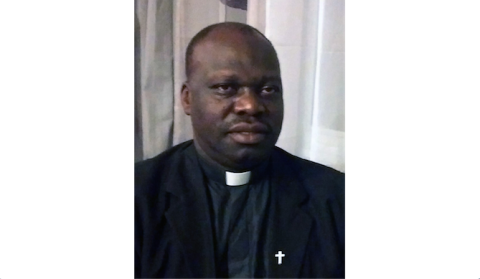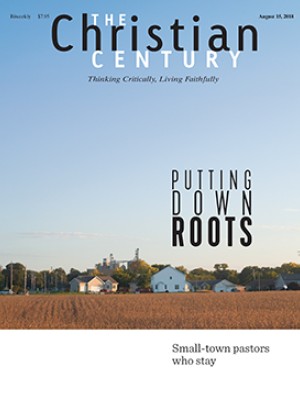CAR priests killed amid faith leaders advocating for an end to the conflict
Firmin Gbagoua was the sixth Catholic priest to be killed. Fighters claim that religion is fueling the conflict—but religious leaders point to economic causes.

Following the recent killing of priests in the Central African Republic, church officials worry that clergy are being targeted by armed groups for their peacemaking efforts.
“The attacks can be seen as an attempt to silence the church for its strong opposition to the violence and its work on peace,” said Nestor-Désiré Nongo-Aziagbia, vice president of the CAR Catholic bishops’ conference. “The Catholic Church has stood for the truth, denouncing all the evil plots and plans to destabilize the country and continue the illegal exploitation” of mineral resources.
In late June, Firmin Gbagoua, who served as the regional director of Caritas, an international Catholic relief group, became the sixth Catholic priest to be killed in the conflict, which has pitted Anti-balaka militias, who are mainly Christian and animist, against ex-Séléka rebels, who are mostly Muslim.
Read our latest issue or browse back issues.
The Central African Republic descended into conflict in 2013, when Séléka, which means “coalition,” overthrew President François Bozizé and installed their leader, Michel Djotodia. The rebel coalition burned villages and attacked and looted churches across the country. As president until 2014, Djotodia attempted to dissolve Séléka, but splinter groups continue fighting as ex-Séléka.
Djotodia’s rise to power ignited counterattacks by Anti-balaka. By the time Djotodia resigned in 2014, Anti-balaka had killed and injured thousands of Muslims. Hundreds of thousands more fled to neighboring Chad and Cameroon, while some church groups gave shelter to Muslim people—as many as 2,000 in one parish.
In 2014 Saliou Mbacké, coordinator of Inter-Faith Action for Peace in Africa, issued an appeal to both groups “to cease the attacks and live side by side as they have done for many years.” He said, “This is clearly manipulation of religion for some political gains, which must be rejected in Africa.”
Other religious leaders have also rejected the claim by fighters on both sides that religious belief is behind the conflict. They have pointed to political and economic reasons for the fighting while trying to steer both sides toward peace.
Dieudonné Nzapalainga, archbishop of Bangui, the capital, and Kobine Layama, head of the country’s Islamic community, have appeared together in conflict zones as a symbol of unity.
Scholars said that faith leaders on both sides are being attacked since they are perceived as interfering with mining natural resources or supporting the other side when they preach peace.
“It is an economic and political conflict,” said Abdallah Kheir, a scholar of African studies and Islamic studies at Kenyatta University in Nairobi. “Some people are benefiting. And when the clerics push for peace, they are seen as interfering with the business.”
Three years ago, a transitional council adopted a new constitution aimed in part to quell violence. But since then, armed groups that splintered from Séléka and Anti-balaka continue to carry out assassinations, other killing, and rape, according to human rights groups.
Francis Kuria Kagema, secretary general of the African Council of Religious Leaders, urged the fighting groups to consider the suffering of innocent citizens.
“They should rethink the new constitution,” Kuria said. That would offer the country “a chance for a new beginning.”
According to Kuria, the country needs more grassroots peace efforts. He noted that most of the minority Muslim population was dislocated during the conflict, and he called for support for their resettlement.
Hamid Byamugenzi, deputy director of the Islamic University in Uganda, expressed concern that the violence in CAR could spread to other areas.
“My fear is the tragedy may lead us into deep trouble like the Rwanda genocide,” he said. —Religion News Service
A version of this article, which was edited August 8, appears in the print edition under the title “Priests killed in CAR as faith leaders advocate for an end to the conflict.’”






